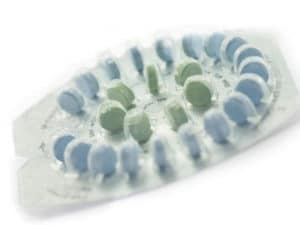
Fertility Superstition #1: Being on oral contraceptive (birth control pills) for many years can reduce your chances of conception.

It is the goal of birth control to prevent pregnancy by preventing ovulation. When a woman decides to stop taking the pill, the hormones leave the body rather quickly – usually within a couple of days, regardless of how long she was on the pill.
As soon as the hormones are out of your system, your body starts to produce hormones to start your menstrual cycle. Different women will respond differently to this process, some taking a couple weeks to ovulate, others may take several months.
If you did have problems with ovulation prior to taking birth control pills, those may continue when you stop.
Fertility Superstition #2: There are certain sex positions that will more likely result in pregnancy.
While the goal is to have the sperm as close to the cervix as possible, in general, the sexual position you choose will not have any bearing chances of conception. There are no studies to support that any one position increases the likelihood of pregnancy.
Fertility Superstition #3: Lifting your legs in the air after sex will help you get pregnant.
As for your post-coital routine, healthy sperm will begin swimming immediately after ejaculation so there is no need to lay with your feet in the air after intercourse to help them out.
When a patient comes in for treatment, we do advise they lay still for 5 minutes after their embryo transfer and treat their bodies as if they are pregnant until it is time to take their first pregnancy 2 weeks later. That means no alcohol, a healthy diet and only moderate exercise.
Fertility Superstition #4: Eating certain food like yams, dairy products or cough syrup will help you conceive (or have twins!).
While it is important to maintain a healthy diet and get certain nutrients, there is no evidence that particular foods will result in a pregnancy or twins.
And as for taking cough syrup, this superstition has been around since the ’80s. The idea was that guaifenesin (a common ingredient in cough syrup) could thin cervical mucus much like it things the mucus in your nasal passages allowing easier travel for sperm to reach the egg. However, no studies have proven this to be true and in fact, taking cough syrup means you are ingesting other ingredients, like antihistamines, which are not good for you fertility.
Fertility Superstition #5: Having sex every day until you get pregnant.
When couples start to consider building a family, they often wonder when they are most fertile or try to make a fertility calendar. Generally speaking, a woman’s fertility window is 6 days leading up to and ending on the day of the ovulation. This is because sperm can live inside the female body for several days and the egg survives for about 24 hours after ovulation. Having intercourse every 24-48 hours leading up to ovulation will increase your chances of pregnancy.
For women that have regular cycles, determining ovulation and your fertility calendar is easy – it is typically 14 days before the start of your next period. However, many women do not have regular cycles, making planning more challenging. Ovulation predictor kits detect rises in luteinizing hormone (LH) which happens prior to ovulation. For those of you already in fertility treating at Shady Grove Fertility you are probably very familiar with LH, as it is part of your basic Day 3 testing and often included in treatment protocols to stimulate the development of eggs.
If you are struggling to conceive, speak with one of our friendly New Patient Liaisons by calling 888-971-7755 or clicking here.







